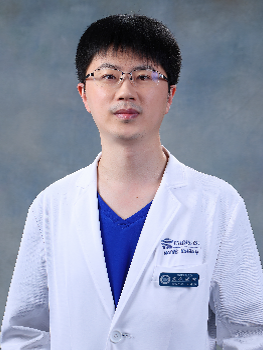
Research Fellow
Attending Neurosurgeon
Neurosurgical Center for Stereotactic Treatment and Functional Disorders
Clinical Expertise:
E-mail: wangkailiang@xwhosp.org
Research Interests
Neuromodulation therapy and research on Parkinson's, dystonia, essential tremor, Tourette's syndrome, Meige syndrome, and other movement disorders and intractable epilepsy. He has performed in-depth research in the field of neuromodulation treatment of Parkinson's, other movement disorders, and epilepsy, including DBS, VNS, RNS, and SCS. He has conducted extensive research in the field of brain networks for epilepsy and movement disorders and proposes the development of the newly emerging branch of epileptic networks neurosurgery (ENN). And He is also interested in the digital health research of movement disorders' symptoms and has independently developed multiple sets of digital wearable devices and brain-computer interface devices.
Background
From 2008.09 to 2013.06, he successfully completed medical studies at Taishan Medical University, and obtained his Bachelor degree. From 2014.09 to 2017.06, attended and finished 3-years resident standardizing training program for medical students majoring in neurosurgery at Capital Medical University. And took part in some neuroscience study work mainly in the field of Epilepsy Networks and Deep Brain Stimulation for Parkinson’s Disease. Dr. Wang completed his clinical and scientific training at Beijing Neurosurgical Institute, Capital Medical University. From 2017.09 to 2020.06, he went on to improve his clinical neurosurgery skills majoring in Functional Neurosurgery following his tutor Professor Prof. Fangang Meng at Beijing Neurosurgical Institute and got a doctor's degree. Meanwhile, during his doctoral studies, he received a research fellow training at the Norman Fixel Institute for Neurological Diseases at the University of Florida in the field of DBS for movement disorders.
Education
2008—2013 Bachelor, Taishan Medical University
2014—2017 M.A. Surgery-Neurosurgery, Beijing Neurosurgical Institute. Capital Medical University
2017—2020 M.D., Functional Neurosurgery, Beijing Neurosurgical Institute. Capital Medical University
Residency
2014—2015 Resident, Department of General Surgery, Beijing Tiantan Hospital
2015—2016 Resident, Department of Urological Surgery, Beijing Friendship Hospital
2016—2016 Resident, Department of Cardiac Surgery, Beijing AnZhen Hospital
2016—2020 Resident, Department of Neurosurgery, Beijing Tiantan Hspital
2020—Now Fellow, Department of Neurosurgery, Beijing Xuanwu Hospital
Fellowship
Visiting scholar and Joint postgraduate research-fellow training at the Norman Fixel Institute for Neurological Diseases at the University of Florida (2018-2019, Prof. Adolfo Ramirez-Zamora and Prof. Michael S Okun ).
Certifications
Physician’s practice license (2014)
Certificate of resident standardized training of Surgery (Neurosurgery) Phase I (2017)
Attending Neurosurgeon (2022)
Awards and honors
He was awarded the Scholarship Grant from Beijing Wang Zhongcheng Medical Foundation (2018), and was awarded the title of Outstanding Visiting Scholar by the International Medical Center of the University of Florida, U.S.A. (2019)
Professional Memberships
Team Member-Medtronic Talent X, 2022.08
Research and Publications
Research:
1. 2014.01-2015.12, “Study on MicroRNA-34a neuroprotection role in Hippocampal Electrical Stimulation of epilepsy”, Grant No.1140170045-14JL52, Meng FG, Zhang JG, et.al., funded by Capital Medical University Foundation-Clinical cooperation research project.
2. 2015.01-2018.12, “The function and regulation mechanism of long non-coding RNA H19 in hippocampal neuronal apoptosis of temporal lobe epilepsy”, Grant No.81471315, Meng FG, et.al. , funded by National Natural Science Foundation of China.
3. 2016.06-2019.06, “study on resting-state networks mechanism of vagus nerve stimualtion for intractable epilepsy using fMRI”, Grant No.Z161100000516078, Meng FG, Wang KL et.al. funded by Beijing Municipal Commission Science and Technology.
4. 2017.07- 2017.12, “Technology promotion of Vagus Nerve Stimulation therapy for intractable epilepsy”, Grant No. TG-2017-52, Meng FG, Zhang JG, et.al. , funded by Beijing Municipal Commission of Health and Family Planning.
5. 2018.01-2020.12, “Study on a portable Digital Evaluation Device for the therapy effect of Parkinson 's Disease with Deep Brain Stimulation based on electromyographic biomarkers”,Grant No. XMLX201817, Meng FG, Wang KL, et.al. , funded by Beijing Municipal Administration of Hospitals.
Published Papers
1. Wang KL, Meng FG: Application of Brain Computer Interface in neurosurgery [J]. Chinese Journal of Neurosurgery, 2016,32(2):213-216.
2. Wang KL, Chai Q, Qiao H, Zhang JG, Liu TH, Meng FG: Vagus nerve stimulation balanced disrupted default-mode network and salience network in a postsurgical epileptic patient. Neuropsychiatr Dis Treat 2016, 12:2561- 2571.
3. Wang KL, Liu TH, Zhao XB, Xia XT, Zhang K, Qiao H, Zhang JG, Meng FG: Comparative Study of Voxel-Based Epileptic Foci Localization Accuracy between Statistical Parametric Mapping and Three-dimensional Stereotactic Surface Projection. Frontiers in neurology 2016, 7:164.
4.Han CL, Liu YP, Zhao XM, Wang KL, Chen N, Hu W, Zhang JG, Ge M*, Meng FG*. Whole-transcriptome screening reveals the regulatory targets and functions of long non-coding RNA H19 in epileptic rats. Biochemical and Biophysical Research Communications, 2017, 489(2)262-269.
5.Meng FG, Wang KL: Inspiration comes from American medical education reforms for the cultivation of Chinese medical graduate education [J]. Medical Education Management, ,2016,2(1):375-378,390.
6.Han CL, Meng FG, Liu Y, Wang KL, Zhao XM, Zhang X, Zhang JG: Long non-coding RNA expression profile of the hippocampus in a rat epilepsy model[J]. Chinese Journal of Neurosurgery, 2015,31(3):304-308.
7.Meng FG, Jia FM, Ren XH, Ge Y, Wang KL, Ma YS, Ge M, Zhang K, Hu WH, Zhang X et al: Vagus Nerve Stimulation for Pediatric and Adult Patients with Pharmaco-resistant Epilepsy. Chinese medical journal 2015, 128(19):2599-2604.
8.Published Books-“Neuromodulation and Application”, 2016.11, ISBN:9787117232838.
9.Wang, K.-L., Hu, W., Liu, T.-H., Zhao, X.-B., Han, C.-L., Xia, X.-T., et al. (2018). Metabolic covariance networks combining graph theory measuring aberrant topological patterns in mesial temporal lobe epilepsy. CNS Neuroscience & Therapeutics 34, 795–13. doi:10.1111/cns.13073.
10.Wang, K.-L., Hess, C. W., Xu, D., Zhang, J.-G., Hu, W., and Meng, F.-G. (2019). High Frequency Bilateral Globus Pallidus Interna Deep Brain Stimulation Can Improve Both Chorea and Dysarthria in Chorea-acanthocytosis. Parkinsonism and Related Disorders. doi:10.1016/j.parkreldis.2019.01.008.
Book/Book Chapters
《Neuromodulation Techniques Applications》, 《Clinical Neurosurgery》, 《Vagus Nerve Stimulation》
Any use of this site constitutes your agreement to the Terms and Conditions and Privacy Policy linked below.
A single copy of these materials may be reprinted for noncommercial personal use only. "China-INI," "chinaini.org" are trademarks of China International Neuroscience Institute.
© 2008-2021 China International Neuroscience Institute (China-INI). All rights reserved.